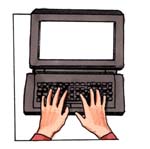Not sure if you should put quote marks around something? Is it dialogue or a direct quote? If not, forget the quote marks. They are most overused form of punctuation. Quote is short for quotation, so quote marks should be used only to set off a quotation in nonfiction. If you’re writing a novel and using quote marks for anything but dialogue—take them out.
Writers like to use quote marks around words they consider special. Old school editors call them scare quotes, a way of alerting readers Read more →
 An editing job I completed recently for a satisfied client (and a layoff ☺) made me rethink my approach. Essentially, I’ve cut my rate in half with the idea that most writers can’t afford an extensive service—they simply want to catch all the typos, misused words, and inconsistencies before they submit anywhere.
An editing job I completed recently for a satisfied client (and a layoff ☺) made me rethink my approach. Essentially, I’ve cut my rate in half with the idea that most writers can’t afford an extensive service—they simply want to catch all the typos, misused words, and inconsistencies before they submit anywhere.
I’m fine-tuning the novel I just finished, and these are some of the edits I’m making. They can help you as you write or edit your own novel.
1. Get rid of unnecessary prepositional phrases. When you read back through your manuscript, watch for phrases like on the table, toward the door, near the wall. These phrases bog down your writing and often add little to a description. Readers can make a lot of assumptions. If two guys are standing in the driveway talking and one points at the tires, readers Read more →
I guest blogged today about how to write a great first draft. There’s lots of helpful information. Stop in.
Working Stiffs
I start many novels; I finish few. After years of writing, editing, and evaluating works of fiction, I have reader ADD. I read mostly crime/mystery/suspense and some sci-fi, but here’s what makes me put down a book:
- Slow start with too much day-in-the-life detail or too much backstory (I like it when a novel makes me think Oh shit in the first few pages)
- Protagonists who do stupid things (especially before I start to like them)
- Stories that jump back and forth in time for no good reason
- Characters who have cutsie names or are obsessed with their pets (Sorry!)
- Detailed gratuitous graphic violence
- Detailed graphic sex scenes (They’re all gratuitous unless you write erotica)
- Characters who bicker with their siblings or spouses (I’ve seen a lot of this lately!)
- Too many characters introduced in the first few pages with no real explanation of who they are
- Pages and pages with no dialogue
- Protagonists who engage in immoral acts, like harming an innocent person (I need at least one person to root for)
- Long, meandering side stories that take me out of the main plot
- Serial killers (No offense if you write them, I’m just burnt out)
What makes you put down a book?
I’ve been editing the first draft of my new novel, and I became aware of some changes I consistently make—for the better. I’ll share them here, in case you find them useful.
1. I get rid of the word “it” and replace it with the specific thing that I’m referring to, even if I just named that thing in the previous sentence. “Jackson reached for his Glock. The weapon felt heavy in his hand” is better than “Jackson reached for his Glock. It felt heavy in his hand.” In verbal communication, repetitive use of “it” may be acceptable, but in narrative writing such lack of clarity is ineffective and often confusing.
2. The same is true of overuse of pronouns. So I’ve also consistently replaced “she,” “he,” and “they” with the specific name of the character(s). Sometimes it feels too formal to use the character’s name three times in a paragraph, but if the character, say, a guy named Jack, is talking about the suspect, a guy named Vinnie, then referring to either of these guys as “he” can be confusing to the reader. This is a point that Stephen King makes in his great book On Writing.
3. The third most consistent edit I make is to tweak individual scenes so that they read like mini-stories, with mounting tension, a climax, and a conclusion. The exception to that structure are scenes at the end of chapters, which I often leave with a revelation, a hint of a revelation, or a great deal of uncertainty (aka, cliffhangers).
